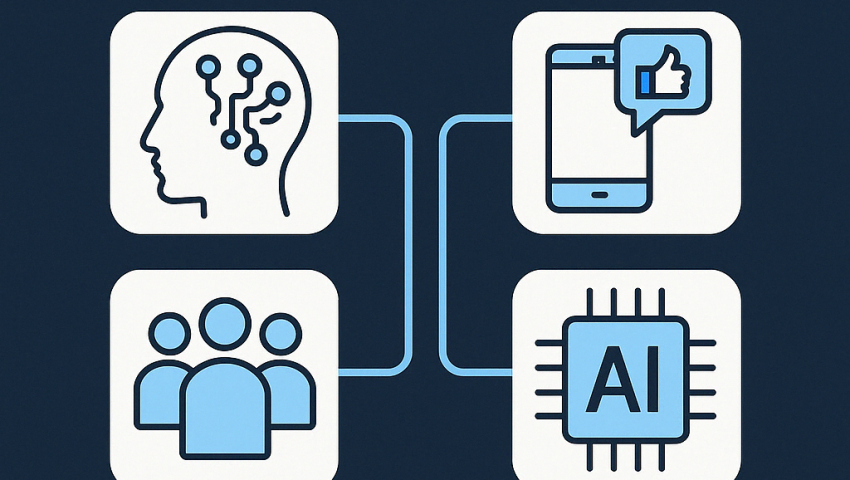
The Importance of AI in Mobile Applications Used by Social Networking Apps
In mobile applications, especially those in the social networking domain, AI is not just a feature — it's the backbone of innovation and engagement. Let’s explore how and why AI plays such a crucial role in the development and functioning of social networking apps.
In today’s hyper-connected world, social networking applications have become an integral part of our daily lives. From catching up with friends to discovering content, networking for jobs to building communities, social media platforms like Instagram, Facebook, Twitter (now X), LinkedIn, TikTok, and Snapchat are shaping the way people interact online. But behind the scenes, there's a powerful force making all these experiences smarter, faster, and more personalized: Artificial Intelligence (AI).
1. Personalized User Experience
One of the most noticeable benefits of AI in social networking mobile apps is personalization. Social apps collect massive amounts of data — from the posts users like, share, or comment on, to how much time they spend on each type of content.
AI Enhancements:
- Content recommendation engines suggest posts, videos, or profiles users are likely to engage with.
- News feeds are arranged using algorithms that prioritize relevant content.
- Auto-tagging in photos or suggesting hashtags based on content.
AI ensures that every user’s experience is unique, increasing engagement and time spent on the platform.
2. Smart Chatbots and Automated Support
AI-powered chatbots have transformed the way users interact with social apps — from handling FAQs to guiding them through app features.
Use Cases:
- Customer Support Bots: Provide instant replies to user queries.
- In-app Assistants: Help users navigate the app, recommend content, or remind users of unread messages.
- Messenger Bots: On platforms like Facebook Messenger, businesses use bots to communicate and market directly to users.
These bots enhance the user experience, reduce wait times, and offer 24/7 support.
3. Enhanced Security and Content Moderation
AI plays a vital role in ensuring that social media remains a safe and trustworthy environment.
AI Contributions:
- Spam detection: Automatically flagging spam or fake accounts.
- Toxic content filtering: Detecting and removing hate speech, abusive language, or inappropriate content.
- Phishing and fraud detection: Identifying suspicious activity like fake giveaways or impersonations.
By automating moderation, AI significantly reduces human workload and keeps platforms secure.
4. Image and Facial Recognition
Social networking apps are visual by nature, and AI’s capabilities in image processing are revolutionary.
Applications:
- Face filters and AR lenses: AI enables face tracking in real-time for fun and engaging experiences (e.g., Snapchat).
- Photo organization: AI can group photos based on who appears in them or the objects detected.
- Automatic tagging: Apps like Facebook use AI to recognize faces in images and suggest tagging friends.
This not only enhances the user experience but also creates engaging, immersive features.
5. Predictive Analytics for Business Insights
For businesses and content creators using social media for marketing, AI-powered analytics provide deep insights into user behavior and content performance.
Examples:
- Audience segmentation: Understand who is engaging with content and why.
- Engagement forecasting: Predict which posts are likely to go viral.
- Ad optimization: Automatically adjust ad placements and targeting to maximize ROI.
This allows marketers to make data-driven decisions and improve their social media strategies.
6. Voice and Language Processing
With the rise of voice-based interactions, AI enables natural language processing (NLP) and speech recognition features.
Real-world Benefits:
- Voice assistants in apps to help navigate, search, or post updates.
- Speech-to-text for stories, posts, or messages.
- Language translation for global communication across language barriers.
These features improve accessibility and make social networking more inclusive.
7. AI-Powered Video and Audio Features
Short-form content, reels, and video stories dominate social media. AI helps in content creation, editing, and enhancement.
Tools and Features:
- Background removal or replacement in videos.
- Smart video cropping for different aspect ratios.
- Audio enhancement to remove background noise or add effects.
Creators can now produce high-quality content directly from their phones, thanks to AI.
8. Behavioral Analytics and Addiction Control
AI can help identify when a user might be overusing the app or showing signs of digital fatigue.
AI Measures:
- Usage pattern analysis: AI can detect binge usage or unusual behavior.
- Notifications for breaks: Encourage digital well-being through reminders or screen time limits.
- Mental health indicators: Some platforms experiment with detecting signs of distress from posts or messages.
This reflects a responsible approach to user engagement.
9. Real-Time Recommendations and Trends
AI helps social apps stay relevant by quickly identifying and reacting to trends.
How it Works:
- Trend spotting algorithms: Detect hashtags, topics, or challenges going viral.
- Real-time updates: Suggest trending content or communities.
- Location-based suggestions: Local events, businesses, or posts can be recommended based on AI.
It keeps the user always connected to what’s trending around them.
10. Continuous Learning and Adaptation
AI systems in social media are constantly learning from user data, behaviors, and interactions.
This means:
- Better recommendations over time
- Smarter content filtering
- More relevant ads and promotions
- Improved app performance through data-driven optimizations
The result is a more intelligent, user-centric mobile app experience.

Cloudsat Admin
Leave a comment
Your email address will not be published. Required fields are marked *

